Management Theory and Practices: Historical Development and Impact
VerifiedAdded on 2023/01/13
|9
|2556
|75
Essay
AI Summary
This essay provides a comprehensive overview of the evolution of management practices, beginning with traditional methods before the Industrial Revolution and tracing the development of management as a scientific discipline. It explores the impact of the Industrial Revolution on business environments and organizations, highlighting the shift towards classical management theory and its focus on improving productivity and efficiency. The essay further examines the emergence of various management frameworks in the post-industrial era, including bureaucratic, scientific, and administrative approaches. It discusses the key principles and characteristics of each framework, emphasizing their contributions to managing business operations effectively. The conclusion summarizes the importance of management practices in navigating dynamic business environments and achieving organizational goals. The essay is a student contribution available on Desklib.
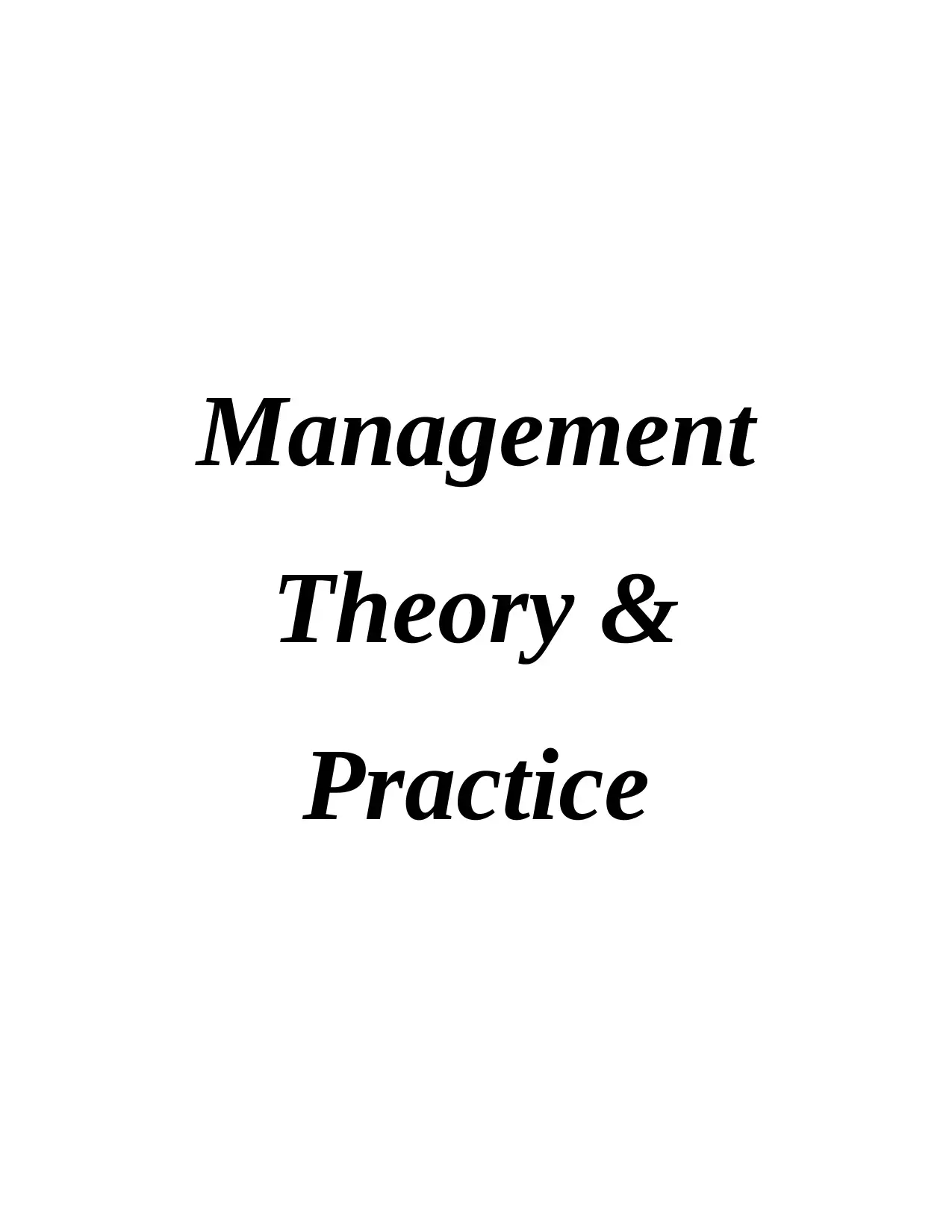
Management
Theory &
Practice
Theory &
Practice
Paraphrase This Document
Need a fresh take? Get an instant paraphrase of this document with our AI Paraphraser
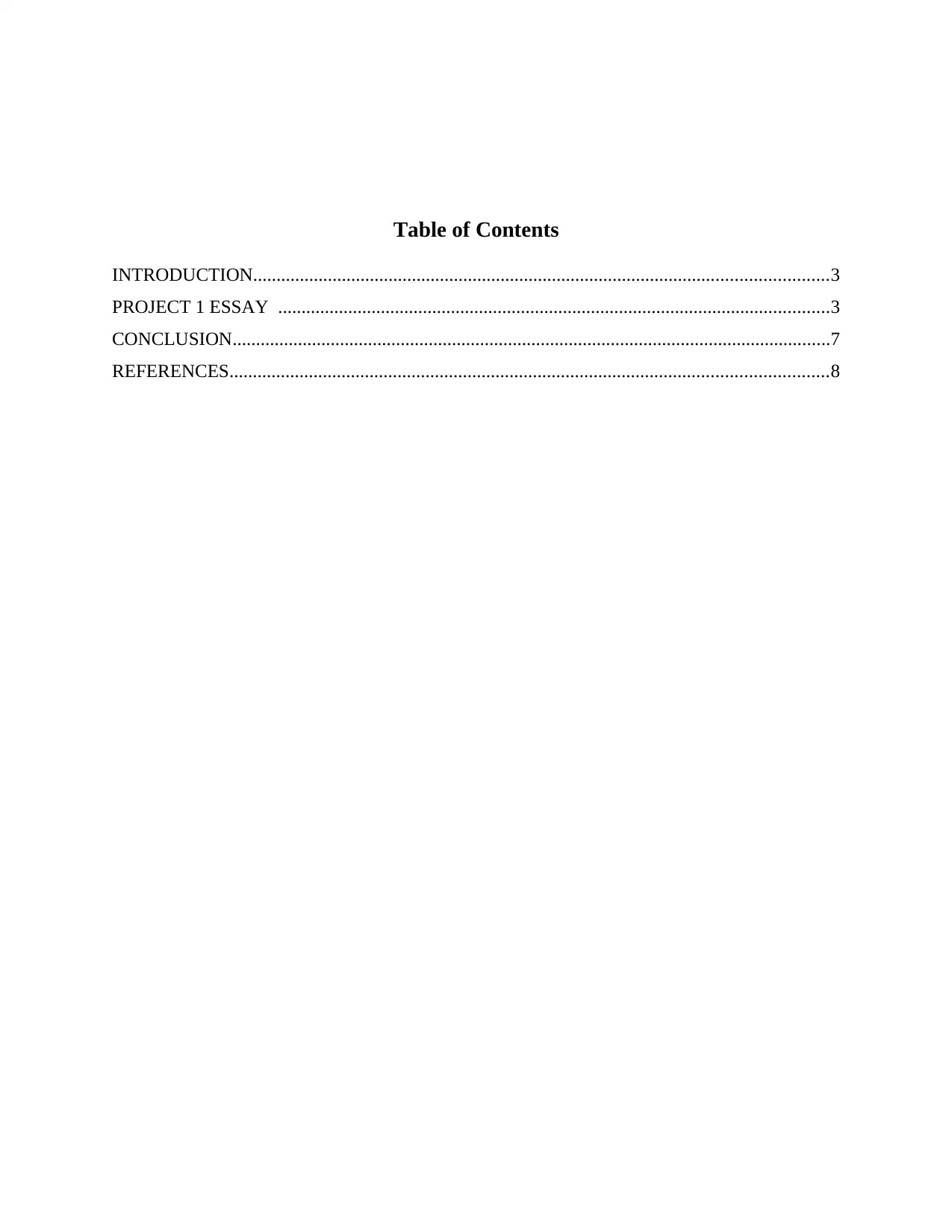
Table of Contents
INTRODUCTION...........................................................................................................................3
PROJECT 1 ESSAY ......................................................................................................................3
CONCLUSION................................................................................................................................7
REFERENCES................................................................................................................................8
INTRODUCTION...........................................................................................................................3
PROJECT 1 ESSAY ......................................................................................................................3
CONCLUSION................................................................................................................................7
REFERENCES................................................................................................................................8
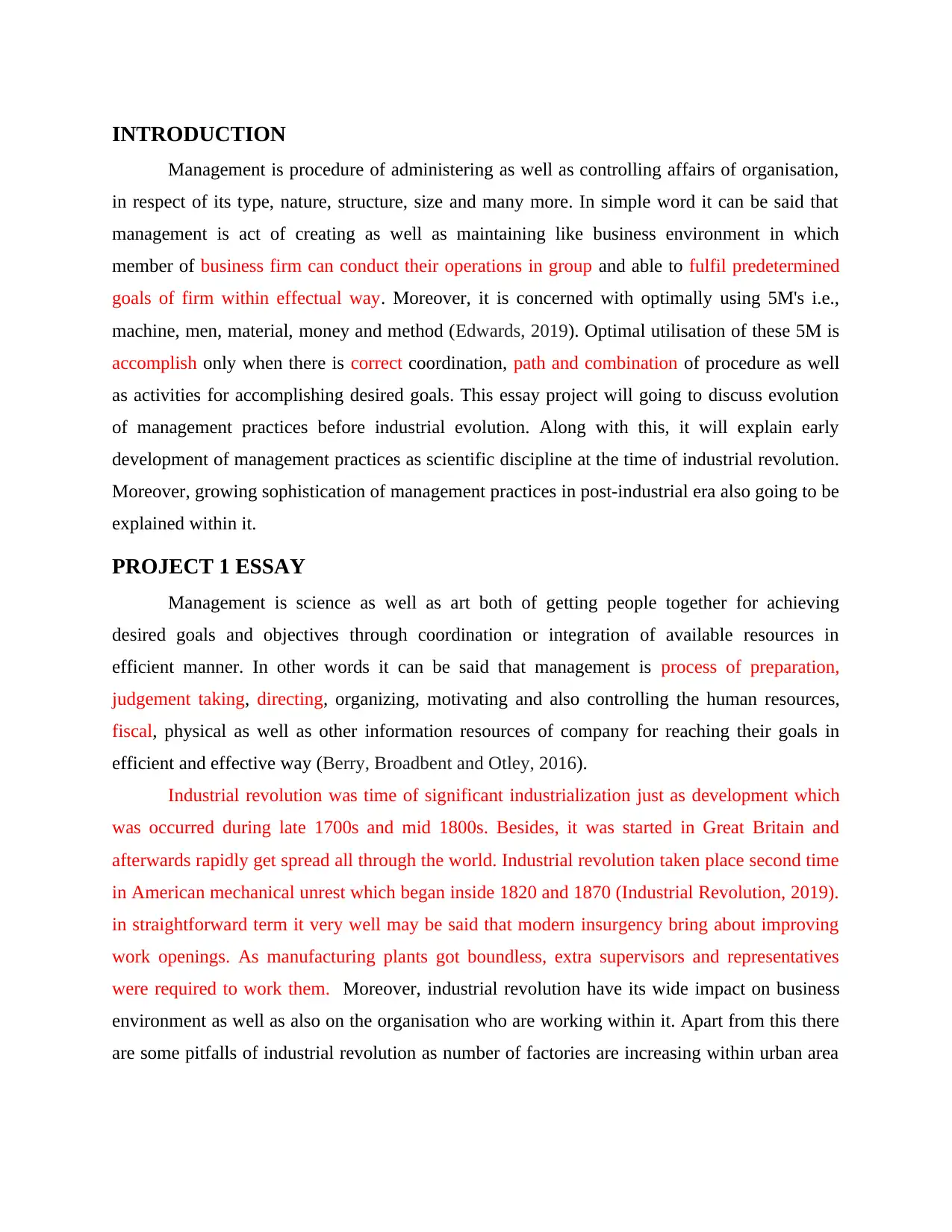
INTRODUCTION
Management is procedure of administering as well as controlling affairs of organisation,
in respect of its type, nature, structure, size and many more. In simple word it can be said that
management is act of creating as well as maintaining like business environment in which
member of business firm can conduct their operations in group and able to fulfil predetermined
goals of firm within effectual way. Moreover, it is concerned with optimally using 5M's i.e.,
machine, men, material, money and method (Edwards, 2019). Optimal utilisation of these 5M is
accomplish only when there is correct coordination, path and combination of procedure as well
as activities for accomplishing desired goals. This essay project will going to discuss evolution
of management practices before industrial evolution. Along with this, it will explain early
development of management practices as scientific discipline at the time of industrial revolution.
Moreover, growing sophistication of management practices in post-industrial era also going to be
explained within it.
PROJECT 1 ESSAY
Management is science as well as art both of getting people together for achieving
desired goals and objectives through coordination or integration of available resources in
efficient manner. In other words it can be said that management is process of preparation,
judgement taking, directing, organizing, motivating and also controlling the human resources,
fiscal, physical as well as other information resources of company for reaching their goals in
efficient and effective way (Berry, Broadbent and Otley, 2016).
Industrial revolution was time of significant industrialization just as development which
was occurred during late 1700s and mid 1800s. Besides, it was started in Great Britain and
afterwards rapidly get spread all through the world. Industrial revolution taken place second time
in American mechanical unrest which began inside 1820 and 1870 (Industrial Revolution, 2019).
in straightforward term it very well may be said that modern insurgency bring about improving
work openings. As manufacturing plants got boundless, extra supervisors and representatives
were required to work them. Moreover, industrial revolution have its wide impact on business
environment as well as also on the organisation who are working within it. Apart from this there
are some pitfalls of industrial revolution as number of factories are increasing within urban area
Management is procedure of administering as well as controlling affairs of organisation,
in respect of its type, nature, structure, size and many more. In simple word it can be said that
management is act of creating as well as maintaining like business environment in which
member of business firm can conduct their operations in group and able to fulfil predetermined
goals of firm within effectual way. Moreover, it is concerned with optimally using 5M's i.e.,
machine, men, material, money and method (Edwards, 2019). Optimal utilisation of these 5M is
accomplish only when there is correct coordination, path and combination of procedure as well
as activities for accomplishing desired goals. This essay project will going to discuss evolution
of management practices before industrial evolution. Along with this, it will explain early
development of management practices as scientific discipline at the time of industrial revolution.
Moreover, growing sophistication of management practices in post-industrial era also going to be
explained within it.
PROJECT 1 ESSAY
Management is science as well as art both of getting people together for achieving
desired goals and objectives through coordination or integration of available resources in
efficient manner. In other words it can be said that management is process of preparation,
judgement taking, directing, organizing, motivating and also controlling the human resources,
fiscal, physical as well as other information resources of company for reaching their goals in
efficient and effective way (Berry, Broadbent and Otley, 2016).
Industrial revolution was time of significant industrialization just as development which
was occurred during late 1700s and mid 1800s. Besides, it was started in Great Britain and
afterwards rapidly get spread all through the world. Industrial revolution taken place second time
in American mechanical unrest which began inside 1820 and 1870 (Industrial Revolution, 2019).
in straightforward term it very well may be said that modern insurgency bring about improving
work openings. As manufacturing plants got boundless, extra supervisors and representatives
were required to work them. Moreover, industrial revolution have its wide impact on business
environment as well as also on the organisation who are working within it. Apart from this there
are some pitfalls of industrial revolution as number of factories are increasing within urban area
⊘ This is a preview!⊘
Do you want full access?
Subscribe today to unlock all pages.

Trusted by 1+ million students worldwide
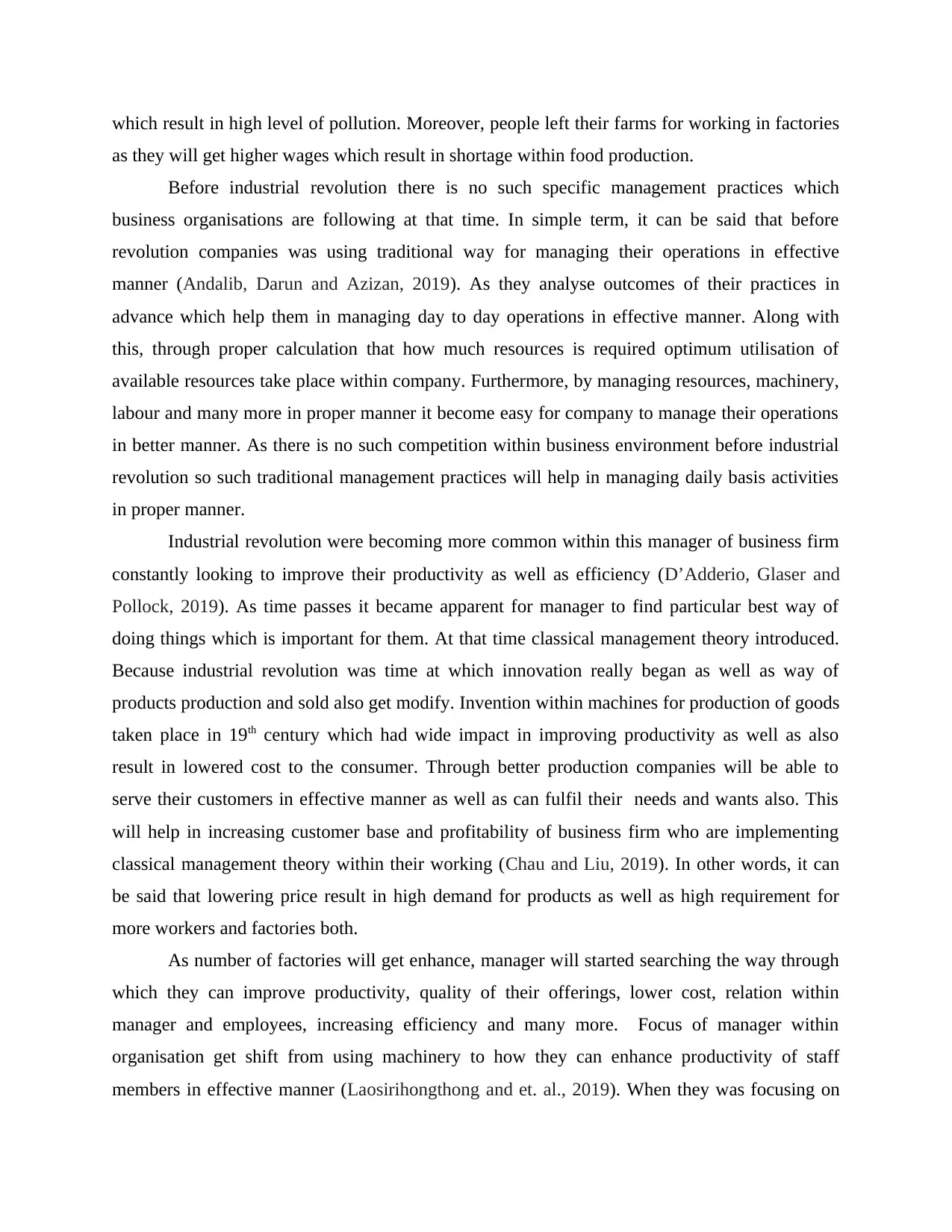
which result in high level of pollution. Moreover, people left their farms for working in factories
as they will get higher wages which result in shortage within food production.
Before industrial revolution there is no such specific management practices which
business organisations are following at that time. In simple term, it can be said that before
revolution companies was using traditional way for managing their operations in effective
manner (Andalib, Darun and Azizan, 2019). As they analyse outcomes of their practices in
advance which help them in managing day to day operations in effective manner. Along with
this, through proper calculation that how much resources is required optimum utilisation of
available resources take place within company. Furthermore, by managing resources, machinery,
labour and many more in proper manner it become easy for company to manage their operations
in better manner. As there is no such competition within business environment before industrial
revolution so such traditional management practices will help in managing daily basis activities
in proper manner.
Industrial revolution were becoming more common within this manager of business firm
constantly looking to improve their productivity as well as efficiency (D’Adderio, Glaser and
Pollock, 2019). As time passes it became apparent for manager to find particular best way of
doing things which is important for them. At that time classical management theory introduced.
Because industrial revolution was time at which innovation really began as well as way of
products production and sold also get modify. Invention within machines for production of goods
taken place in 19th century which had wide impact in improving productivity as well as also
result in lowered cost to the consumer. Through better production companies will be able to
serve their customers in effective manner as well as can fulfil their needs and wants also. This
will help in increasing customer base and profitability of business firm who are implementing
classical management theory within their working (Chau and Liu, 2019). In other words, it can
be said that lowering price result in high demand for products as well as high requirement for
more workers and factories both.
As number of factories will get enhance, manager will started searching the way through
which they can improve productivity, quality of their offerings, lower cost, relation within
manager and employees, increasing efficiency and many more. Focus of manager within
organisation get shift from using machinery to how they can enhance productivity of staff
members in effective manner (Laosirihongthong and et. al., 2019). When they was focusing on
as they will get higher wages which result in shortage within food production.
Before industrial revolution there is no such specific management practices which
business organisations are following at that time. In simple term, it can be said that before
revolution companies was using traditional way for managing their operations in effective
manner (Andalib, Darun and Azizan, 2019). As they analyse outcomes of their practices in
advance which help them in managing day to day operations in effective manner. Along with
this, through proper calculation that how much resources is required optimum utilisation of
available resources take place within company. Furthermore, by managing resources, machinery,
labour and many more in proper manner it become easy for company to manage their operations
in better manner. As there is no such competition within business environment before industrial
revolution so such traditional management practices will help in managing daily basis activities
in proper manner.
Industrial revolution were becoming more common within this manager of business firm
constantly looking to improve their productivity as well as efficiency (D’Adderio, Glaser and
Pollock, 2019). As time passes it became apparent for manager to find particular best way of
doing things which is important for them. At that time classical management theory introduced.
Because industrial revolution was time at which innovation really began as well as way of
products production and sold also get modify. Invention within machines for production of goods
taken place in 19th century which had wide impact in improving productivity as well as also
result in lowered cost to the consumer. Through better production companies will be able to
serve their customers in effective manner as well as can fulfil their needs and wants also. This
will help in increasing customer base and profitability of business firm who are implementing
classical management theory within their working (Chau and Liu, 2019). In other words, it can
be said that lowering price result in high demand for products as well as high requirement for
more workers and factories both.
As number of factories will get enhance, manager will started searching the way through
which they can improve productivity, quality of their offerings, lower cost, relation within
manager and employees, increasing efficiency and many more. Focus of manager within
organisation get shift from using machinery to how they can enhance productivity of staff
members in effective manner (Laosirihongthong and et. al., 2019). When they was focusing on
Paraphrase This Document
Need a fresh take? Get an instant paraphrase of this document with our AI Paraphraser
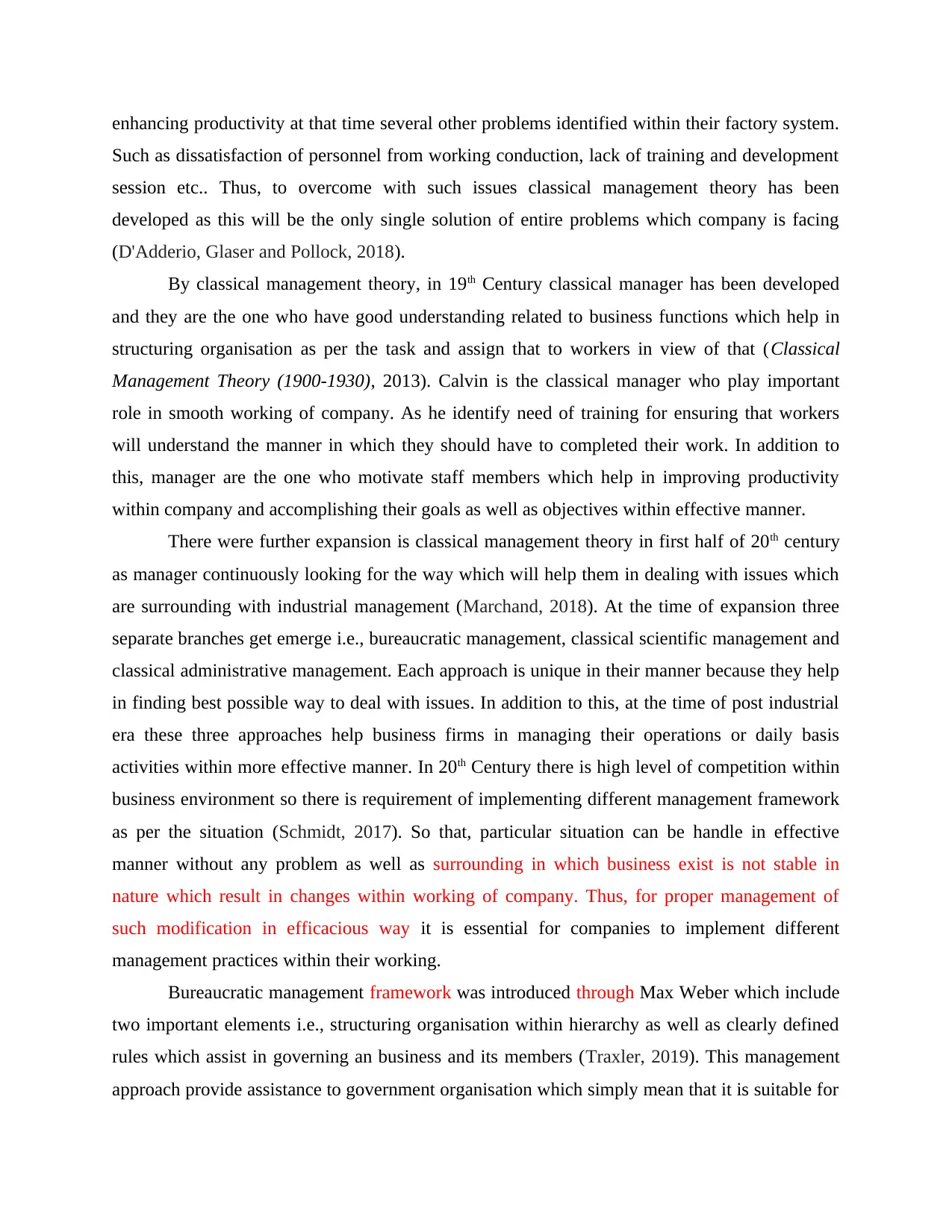
enhancing productivity at that time several other problems identified within their factory system.
Such as dissatisfaction of personnel from working conduction, lack of training and development
session etc.. Thus, to overcome with such issues classical management theory has been
developed as this will be the only single solution of entire problems which company is facing
(D'Adderio, Glaser and Pollock, 2018).
By classical management theory, in 19th Century classical manager has been developed
and they are the one who have good understanding related to business functions which help in
structuring organisation as per the task and assign that to workers in view of that (Classical
Management Theory (1900-1930), 2013). Calvin is the classical manager who play important
role in smooth working of company. As he identify need of training for ensuring that workers
will understand the manner in which they should have to completed their work. In addition to
this, manager are the one who motivate staff members which help in improving productivity
within company and accomplishing their goals as well as objectives within effective manner.
There were further expansion is classical management theory in first half of 20th century
as manager continuously looking for the way which will help them in dealing with issues which
are surrounding with industrial management (Marchand, 2018). At the time of expansion three
separate branches get emerge i.e., bureaucratic management, classical scientific management and
classical administrative management. Each approach is unique in their manner because they help
in finding best possible way to deal with issues. In addition to this, at the time of post industrial
era these three approaches help business firms in managing their operations or daily basis
activities within more effective manner. In 20th Century there is high level of competition within
business environment so there is requirement of implementing different management framework
as per the situation (Schmidt, 2017). So that, particular situation can be handle in effective
manner without any problem as well as surrounding in which business exist is not stable in
nature which result in changes within working of company. Thus, for proper management of
such modification in efficacious way it is essential for companies to implement different
management practices within their working.
Bureaucratic management framework was introduced through Max Weber which include
two important elements i.e., structuring organisation within hierarchy as well as clearly defined
rules which assist in governing an business and its members (Traxler, 2019). This management
approach provide assistance to government organisation which simply mean that it is suitable for
Such as dissatisfaction of personnel from working conduction, lack of training and development
session etc.. Thus, to overcome with such issues classical management theory has been
developed as this will be the only single solution of entire problems which company is facing
(D'Adderio, Glaser and Pollock, 2018).
By classical management theory, in 19th Century classical manager has been developed
and they are the one who have good understanding related to business functions which help in
structuring organisation as per the task and assign that to workers in view of that (Classical
Management Theory (1900-1930), 2013). Calvin is the classical manager who play important
role in smooth working of company. As he identify need of training for ensuring that workers
will understand the manner in which they should have to completed their work. In addition to
this, manager are the one who motivate staff members which help in improving productivity
within company and accomplishing their goals as well as objectives within effective manner.
There were further expansion is classical management theory in first half of 20th century
as manager continuously looking for the way which will help them in dealing with issues which
are surrounding with industrial management (Marchand, 2018). At the time of expansion three
separate branches get emerge i.e., bureaucratic management, classical scientific management and
classical administrative management. Each approach is unique in their manner because they help
in finding best possible way to deal with issues. In addition to this, at the time of post industrial
era these three approaches help business firms in managing their operations or daily basis
activities within more effective manner. In 20th Century there is high level of competition within
business environment so there is requirement of implementing different management framework
as per the situation (Schmidt, 2017). So that, particular situation can be handle in effective
manner without any problem as well as surrounding in which business exist is not stable in
nature which result in changes within working of company. Thus, for proper management of
such modification in efficacious way it is essential for companies to implement different
management practices within their working.
Bureaucratic management framework was introduced through Max Weber which include
two important elements i.e., structuring organisation within hierarchy as well as clearly defined
rules which assist in governing an business and its members (Traxler, 2019). This management
approach provide assistance to government organisation which simply mean that it is suitable for
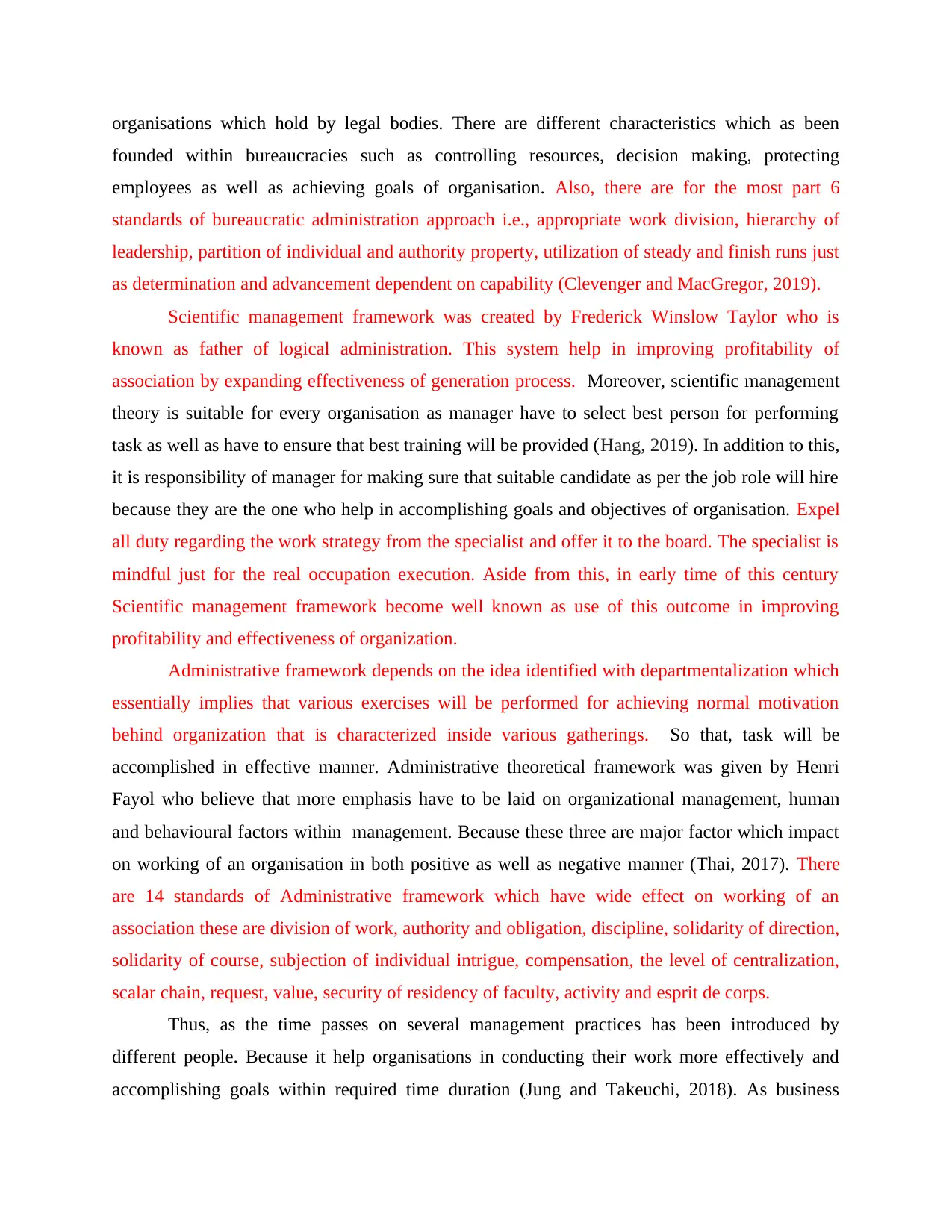
organisations which hold by legal bodies. There are different characteristics which as been
founded within bureaucracies such as controlling resources, decision making, protecting
employees as well as achieving goals of organisation. Also, there are for the most part 6
standards of bureaucratic administration approach i.e., appropriate work division, hierarchy of
leadership, partition of individual and authority property, utilization of steady and finish runs just
as determination and advancement dependent on capability (Clevenger and MacGregor, 2019).
Scientific management framework was created by Frederick Winslow Taylor who is
known as father of logical administration. This system help in improving profitability of
association by expanding effectiveness of generation process. Moreover, scientific management
theory is suitable for every organisation as manager have to select best person for performing
task as well as have to ensure that best training will be provided (Hang, 2019). In addition to this,
it is responsibility of manager for making sure that suitable candidate as per the job role will hire
because they are the one who help in accomplishing goals and objectives of organisation. Expel
all duty regarding the work strategy from the specialist and offer it to the board. The specialist is
mindful just for the real occupation execution. Aside from this, in early time of this century
Scientific management framework become well known as use of this outcome in improving
profitability and effectiveness of organization.
Administrative framework depends on the idea identified with departmentalization which
essentially implies that various exercises will be performed for achieving normal motivation
behind organization that is characterized inside various gatherings. So that, task will be
accomplished in effective manner. Administrative theoretical framework was given by Henri
Fayol who believe that more emphasis have to be laid on organizational management, human
and behavioural factors within management. Because these three are major factor which impact
on working of an organisation in both positive as well as negative manner (Thai, 2017). There
are 14 standards of Administrative framework which have wide effect on working of an
association these are division of work, authority and obligation, discipline, solidarity of direction,
solidarity of course, subjection of individual intrigue, compensation, the level of centralization,
scalar chain, request, value, security of residency of faculty, activity and esprit de corps.
Thus, as the time passes on several management practices has been introduced by
different people. Because it help organisations in conducting their work more effectively and
accomplishing goals within required time duration (Jung and Takeuchi, 2018). As business
founded within bureaucracies such as controlling resources, decision making, protecting
employees as well as achieving goals of organisation. Also, there are for the most part 6
standards of bureaucratic administration approach i.e., appropriate work division, hierarchy of
leadership, partition of individual and authority property, utilization of steady and finish runs just
as determination and advancement dependent on capability (Clevenger and MacGregor, 2019).
Scientific management framework was created by Frederick Winslow Taylor who is
known as father of logical administration. This system help in improving profitability of
association by expanding effectiveness of generation process. Moreover, scientific management
theory is suitable for every organisation as manager have to select best person for performing
task as well as have to ensure that best training will be provided (Hang, 2019). In addition to this,
it is responsibility of manager for making sure that suitable candidate as per the job role will hire
because they are the one who help in accomplishing goals and objectives of organisation. Expel
all duty regarding the work strategy from the specialist and offer it to the board. The specialist is
mindful just for the real occupation execution. Aside from this, in early time of this century
Scientific management framework become well known as use of this outcome in improving
profitability and effectiveness of organization.
Administrative framework depends on the idea identified with departmentalization which
essentially implies that various exercises will be performed for achieving normal motivation
behind organization that is characterized inside various gatherings. So that, task will be
accomplished in effective manner. Administrative theoretical framework was given by Henri
Fayol who believe that more emphasis have to be laid on organizational management, human
and behavioural factors within management. Because these three are major factor which impact
on working of an organisation in both positive as well as negative manner (Thai, 2017). There
are 14 standards of Administrative framework which have wide effect on working of an
association these are division of work, authority and obligation, discipline, solidarity of direction,
solidarity of course, subjection of individual intrigue, compensation, the level of centralization,
scalar chain, request, value, security of residency of faculty, activity and esprit de corps.
Thus, as the time passes on several management practices has been introduced by
different people. Because it help organisations in conducting their work more effectively and
accomplishing goals within required time duration (Jung and Takeuchi, 2018). As business
⊘ This is a preview!⊘
Do you want full access?
Subscribe today to unlock all pages.

Trusted by 1+ million students worldwide
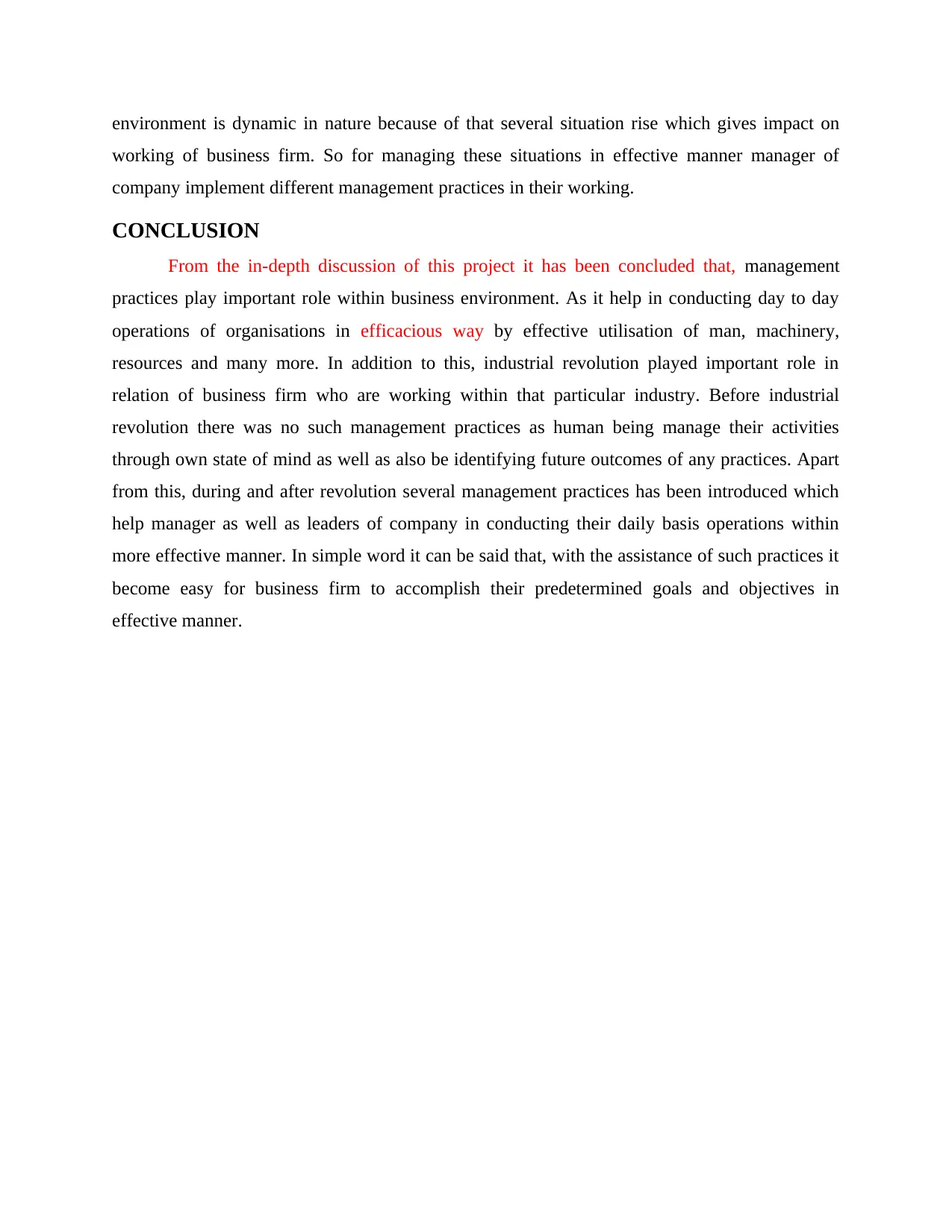
environment is dynamic in nature because of that several situation rise which gives impact on
working of business firm. So for managing these situations in effective manner manager of
company implement different management practices in their working.
CONCLUSION
From the in-depth discussion of this project it has been concluded that, management
practices play important role within business environment. As it help in conducting day to day
operations of organisations in efficacious way by effective utilisation of man, machinery,
resources and many more. In addition to this, industrial revolution played important role in
relation of business firm who are working within that particular industry. Before industrial
revolution there was no such management practices as human being manage their activities
through own state of mind as well as also be identifying future outcomes of any practices. Apart
from this, during and after revolution several management practices has been introduced which
help manager as well as leaders of company in conducting their daily basis operations within
more effective manner. In simple word it can be said that, with the assistance of such practices it
become easy for business firm to accomplish their predetermined goals and objectives in
effective manner.
working of business firm. So for managing these situations in effective manner manager of
company implement different management practices in their working.
CONCLUSION
From the in-depth discussion of this project it has been concluded that, management
practices play important role within business environment. As it help in conducting day to day
operations of organisations in efficacious way by effective utilisation of man, machinery,
resources and many more. In addition to this, industrial revolution played important role in
relation of business firm who are working within that particular industry. Before industrial
revolution there was no such management practices as human being manage their activities
through own state of mind as well as also be identifying future outcomes of any practices. Apart
from this, during and after revolution several management practices has been introduced which
help manager as well as leaders of company in conducting their daily basis operations within
more effective manner. In simple word it can be said that, with the assistance of such practices it
become easy for business firm to accomplish their predetermined goals and objectives in
effective manner.
Paraphrase This Document
Need a fresh take? Get an instant paraphrase of this document with our AI Paraphraser
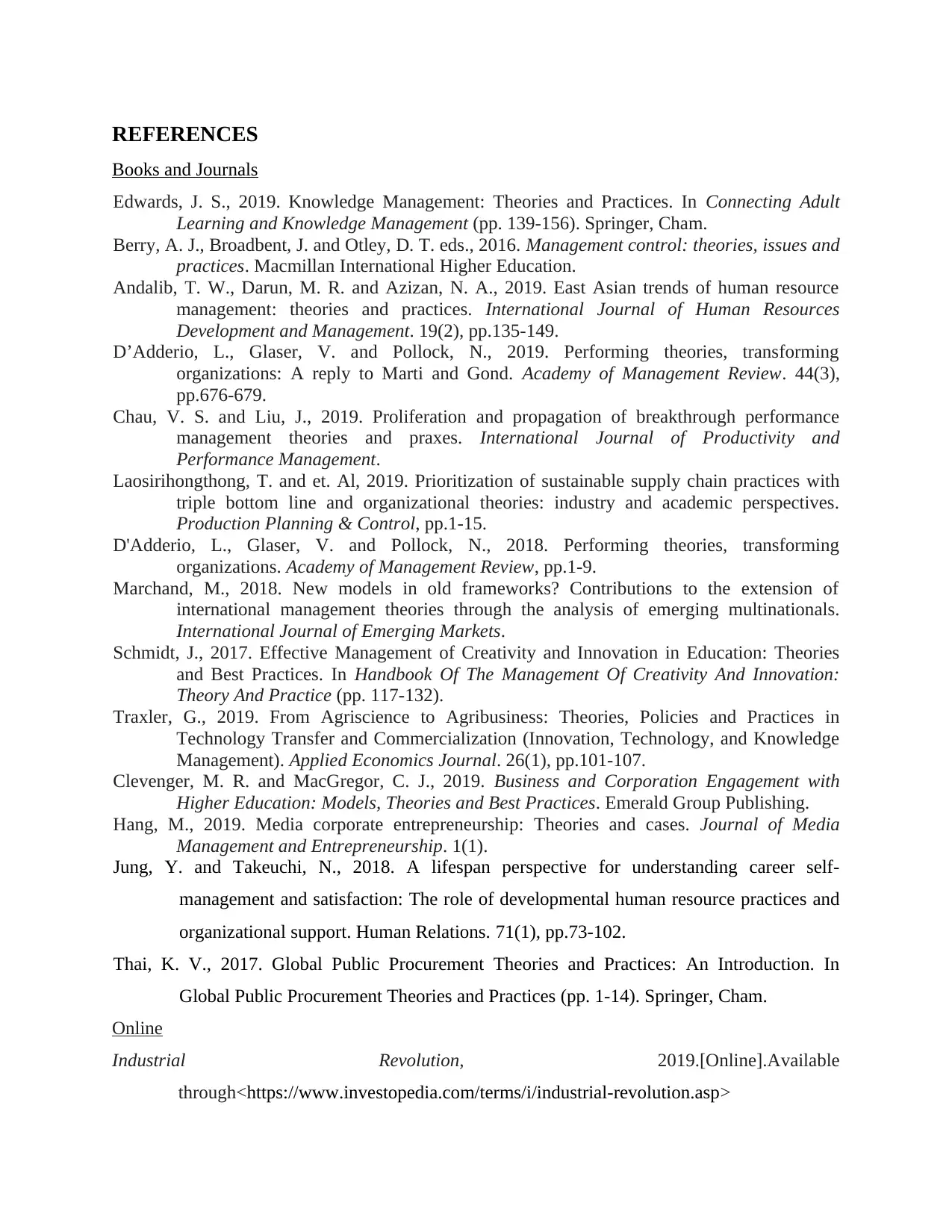
REFERENCES
Books and Journals
Edwards, J. S., 2019. Knowledge Management: Theories and Practices. In Connecting Adult
Learning and Knowledge Management (pp. 139-156). Springer, Cham.
Berry, A. J., Broadbent, J. and Otley, D. T. eds., 2016. Management control: theories, issues and
practices. Macmillan International Higher Education.
Andalib, T. W., Darun, M. R. and Azizan, N. A., 2019. East Asian trends of human resource
management: theories and practices. International Journal of Human Resources
Development and Management. 19(2), pp.135-149.
D’Adderio, L., Glaser, V. and Pollock, N., 2019. Performing theories, transforming
organizations: A reply to Marti and Gond. Academy of Management Review. 44(3),
pp.676-679.
Chau, V. S. and Liu, J., 2019. Proliferation and propagation of breakthrough performance
management theories and praxes. International Journal of Productivity and
Performance Management.
Laosirihongthong, T. and et. Al, 2019. Prioritization of sustainable supply chain practices with
triple bottom line and organizational theories: industry and academic perspectives.
Production Planning & Control, pp.1-15.
D'Adderio, L., Glaser, V. and Pollock, N., 2018. Performing theories, transforming
organizations. Academy of Management Review, pp.1-9.
Marchand, M., 2018. New models in old frameworks? Contributions to the extension of
international management theories through the analysis of emerging multinationals.
International Journal of Emerging Markets.
Schmidt, J., 2017. Effective Management of Creativity and Innovation in Education: Theories
and Best Practices. In Handbook Of The Management Of Creativity And Innovation:
Theory And Practice (pp. 117-132).
Traxler, G., 2019. From Agriscience to Agribusiness: Theories, Policies and Practices in
Technology Transfer and Commercialization (Innovation, Technology, and Knowledge
Management). Applied Economics Journal. 26(1), pp.101-107.
Clevenger, M. R. and MacGregor, C. J., 2019. Business and Corporation Engagement with
Higher Education: Models, Theories and Best Practices. Emerald Group Publishing.
Hang, M., 2019. Media corporate entrepreneurship: Theories and cases. Journal of Media
Management and Entrepreneurship. 1(1).
Jung, Y. and Takeuchi, N., 2018. A lifespan perspective for understanding career self-
management and satisfaction: The role of developmental human resource practices and
organizational support. Human Relations. 71(1), pp.73-102.
Thai, K. V., 2017. Global Public Procurement Theories and Practices: An Introduction. In
Global Public Procurement Theories and Practices (pp. 1-14). Springer, Cham.
Online
Industrial Revolution, 2019.[Online].Available
through<https://www.investopedia.com/terms/i/industrial-revolution.asp>
Books and Journals
Edwards, J. S., 2019. Knowledge Management: Theories and Practices. In Connecting Adult
Learning and Knowledge Management (pp. 139-156). Springer, Cham.
Berry, A. J., Broadbent, J. and Otley, D. T. eds., 2016. Management control: theories, issues and
practices. Macmillan International Higher Education.
Andalib, T. W., Darun, M. R. and Azizan, N. A., 2019. East Asian trends of human resource
management: theories and practices. International Journal of Human Resources
Development and Management. 19(2), pp.135-149.
D’Adderio, L., Glaser, V. and Pollock, N., 2019. Performing theories, transforming
organizations: A reply to Marti and Gond. Academy of Management Review. 44(3),
pp.676-679.
Chau, V. S. and Liu, J., 2019. Proliferation and propagation of breakthrough performance
management theories and praxes. International Journal of Productivity and
Performance Management.
Laosirihongthong, T. and et. Al, 2019. Prioritization of sustainable supply chain practices with
triple bottom line and organizational theories: industry and academic perspectives.
Production Planning & Control, pp.1-15.
D'Adderio, L., Glaser, V. and Pollock, N., 2018. Performing theories, transforming
organizations. Academy of Management Review, pp.1-9.
Marchand, M., 2018. New models in old frameworks? Contributions to the extension of
international management theories through the analysis of emerging multinationals.
International Journal of Emerging Markets.
Schmidt, J., 2017. Effective Management of Creativity and Innovation in Education: Theories
and Best Practices. In Handbook Of The Management Of Creativity And Innovation:
Theory And Practice (pp. 117-132).
Traxler, G., 2019. From Agriscience to Agribusiness: Theories, Policies and Practices in
Technology Transfer and Commercialization (Innovation, Technology, and Knowledge
Management). Applied Economics Journal. 26(1), pp.101-107.
Clevenger, M. R. and MacGregor, C. J., 2019. Business and Corporation Engagement with
Higher Education: Models, Theories and Best Practices. Emerald Group Publishing.
Hang, M., 2019. Media corporate entrepreneurship: Theories and cases. Journal of Media
Management and Entrepreneurship. 1(1).
Jung, Y. and Takeuchi, N., 2018. A lifespan perspective for understanding career self-
management and satisfaction: The role of developmental human resource practices and
organizational support. Human Relations. 71(1), pp.73-102.
Thai, K. V., 2017. Global Public Procurement Theories and Practices: An Introduction. In
Global Public Procurement Theories and Practices (pp. 1-14). Springer, Cham.
Online
Industrial Revolution, 2019.[Online].Available
through<https://www.investopedia.com/terms/i/industrial-revolution.asp>
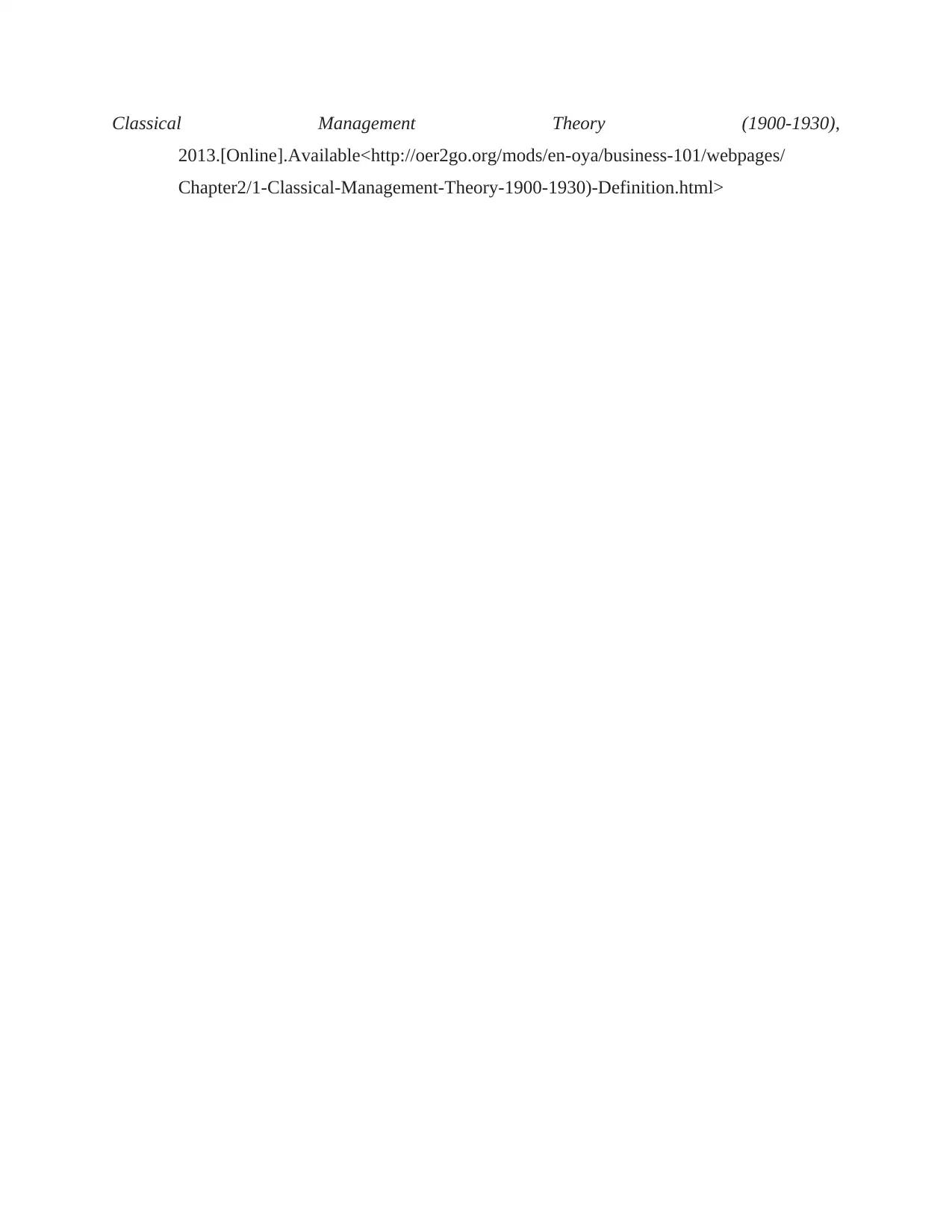
Classical Management Theory (1900-1930),
2013.[Online].Available<http://oer2go.org/mods/en-oya/business-101/webpages/
Chapter2/1-Classical-Management-Theory-1900-1930)-Definition.html>
2013.[Online].Available<http://oer2go.org/mods/en-oya/business-101/webpages/
Chapter2/1-Classical-Management-Theory-1900-1930)-Definition.html>
⊘ This is a preview!⊘
Do you want full access?
Subscribe today to unlock all pages.

Trusted by 1+ million students worldwide
1 out of 9
Related Documents
Your All-in-One AI-Powered Toolkit for Academic Success.
+13062052269
info@desklib.com
Available 24*7 on WhatsApp / Email
![[object Object]](/_next/static/media/star-bottom.7253800d.svg)
Unlock your academic potential
Copyright © 2020–2026 A2Z Services. All Rights Reserved. Developed and managed by ZUCOL.




